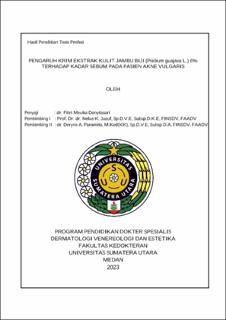| dc.description.abstract | Background: The pathogenesis of acne vulgaris is multifactorial, involving four important factors, including epidermal follicular hyperproliferation, increased sebum production, increased activity of Cutibacterium acnes, and inflammation. Guava peels extract (Psidium guajava L.) is known to contain tannins which have an astringent effect, terpinene has antimicrobial activity against C. acnes, quercetin has antiinflammation and antioxidan effects, and also ascorbic acid has antioxidant effect.
Objective: To determine the effect of guava peel extract cream (Psidium guajava L.) 6% on sebum level in acne vulgaris patients
Subject and Method: This study was a clinical trial with pre-experimental design with a pretest-posttest design involving 30 subjects aged ≥ 18 years with acne vulgaris. Diagnosis was made clinically and evaluations were done by measuring sebum levels using Sebumeter® SM 815 along with total lesions count before and after administering guava peel extract cream, as well as assessing side effects. Data were analyzed using the repeated ANOVA test to assess the reduction in sebum levels, the Friedman test to assess clinical improvement, and considered significant if p<0,05.
Results: This research shows that acne vulgaris is more common in women (56.7%) with the majority occurring in the 18–25 year age group. There were a significant reduction in sebum level (p<0.001) with the average sebum level before administering guava peel extract cream (Psidium guajava L.) 6% was 94,1 μg/cm2 and after was 84,12 μg/cm2 and also it showed a significant clinical improvement based on a reduction of total lesions (p<0.001). There are no side effects occured while using guava peel extract cream (Psidium guajava L.) 6%.
Conclusion: Guava peel extract (Psidium guajava L.) can reduce sebum level and have an effect of acne vulgaris improvement. | en_US |





